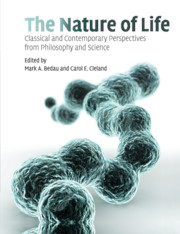Book contents
- Frontmatter
- Contents
- Preface
- Acknowledgments
- Sources
- About the authors
- Introduction
- SECTION I CLASSICAL DISCUSSIONS OF LIFE
- SECTION II THE ORIGIN AND EXTENT OF NATURAL LIFE
- SECTION III ARTIFICIAL LIFE AND SYNTHETIC BIOLOGY
- SECTION IV DEFINING AND EXPLAINING LIFE
- Supplementary bibliography on life
- Index
- References
SECTION I - CLASSICAL DISCUSSIONS OF LIFE
Published online by Cambridge University Press: 10 November 2010
- Frontmatter
- Contents
- Preface
- Acknowledgments
- Sources
- About the authors
- Introduction
- SECTION I CLASSICAL DISCUSSIONS OF LIFE
- SECTION II THE ORIGIN AND EXTENT OF NATURAL LIFE
- SECTION III ARTIFICIAL LIFE AND SYNTHETIC BIOLOGY
- SECTION IV DEFINING AND EXPLAINING LIFE
- Supplementary bibliography on life
- Index
- References
Summary
Humans have long been puzzled about the nature of life—how living things are similar to and different from nonliving things, both natural and artificial, and whether the characteristics that are universal in familiar Earth life are genuinely essential to all possible forms of life. The chapters in this section provide classical historical perspectives on present day philosophical and scientific debates about life. These perspectives have an often underappreciated and sometimes even unrecognized influence on current philosophical and scientific thought. Cutting-edge contemporary ideas are sometimes not so novel after all! More importantly, however, sometimes the older debates, which typically focus on more general, and hence more fundamental, conceptual issues, can provide unexpected insights into present-day controversies.
This section begins with the writings of three intellectual giants: Aristotle, René Descartes, and Immanuel Kant. Best known today for their philosophical work, each also made important contributions to the development of modern science. Each holds a different view about the nature of life. As the remaining chapters in this book illustrate, the differences between them are still relevant today.
One central theme running from the writings of the ancient Greek philosopher Aristotle right up to the present is the idea that living things have distinctive functional characteristics. Aristotle also thought that living things are distinguished from inanimate objects by the ability to self-organize (develop from fertilized eggs) and maintain this self-organization against both internal and external perturbations.
- Type
- Chapter
- Information
- The Nature of LifeClassical and Contemporary Perspectives from Philosophy and Science, pp. 1 - 8Publisher: Cambridge University PressPrint publication year: 2010



